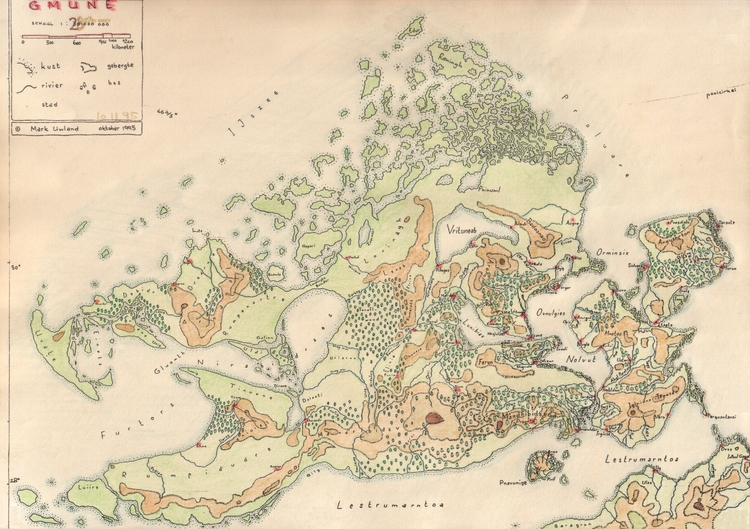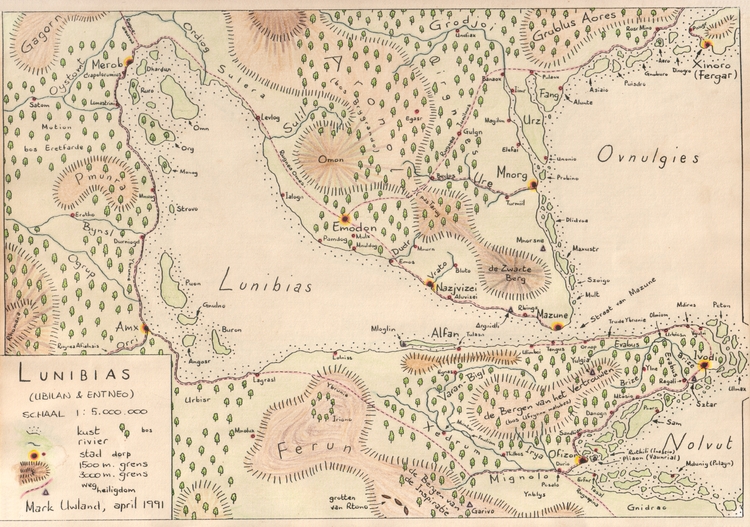 Ubilan
UbilanThe country Ubilan is situated in the continent Gmune, the position of which is undefined. The inhabitants call the planet earth, but it is unlikely that they refer to the same Earth we live on.
The culture of Ubilan is in an early stage. There is hardly any mechanisation or industrialisation, the first use of iron was just a small number of centuries ago, and paper money hasn't been invented yet. But there is an unprecedented prosperity in the culture of Ubilan. Science, art and philosophy are in the whole of Gmune more popular than ever, and trade and politics are very popular. The first fictional stories were written only a short time ago, and the first democracy was only recently founded.
Gmune is roughly of the same size as Europe, and the country Ubilan is about the size of France. The proportions (and shape) of the planet are comparable to those of 'our' Earth. In my description of the country the four main subjects came to be the language, history, politics and religion.

Map of Gmune. Click to see a version of 817 KB.
The people in Ubilan speak Irbiox, a relatively easy language with an alphabet of twenty-three letters. About a quarter of the people is able to read and write, a huge percentage compared to other countries in Gmune. Also in its written form the Irbiox is easily recognizable as a spoken language. Often syllables or even complete words can be omitted.
Across Gmune other languages are being spoken, sometimes using different alphabets and large grammatical differences. Most groups of languages in the continent are small, which means that only small groups of people are able to understand eachother. There's languages with no more than two different kinds of words, languages with an alphabet made up out of notions, and there's a language which in writing goes down the first line, up the second, down the third, etcetera.
The history of Gmune isn't very old yet. The creation of the world is an essential and quite large part of it. The history is commonly divided into three eras. The first era comprises the creation and the origin of civilization in the continent. The second era comprises the dispersion of the people throughout the continent, the first wars, the arrival in Gmune of the messengers of the gods, and the arrival in Gmune of a number of the gods themselves. Finally the third era comprises the epidemics and migrations of the nations, the prosperity of arts, science and politics, and the wars for political power in Gmune. It is estimated that the second and third era together now have lasted about a little less than four thousand years.
In Gmune many different dictators are in power. Some are horrible power maniacs, wielding a strong power, but others are almost unknown to their peoples but are only known to their colleagues. Not long ago the first democracy of Gmune was founded in Ubilan. The inhabitants of the country have recently for the third time in history in the city Ofizor chosen a representation of the people and a president.
In the larger part of Gmune the people believe in the Ivodian religion, which is an attitude or a view to life, more than a collection of rules and regulations that are true in an absolute sense. The religion is very peace-loving, nuancing and tolerant. Respect to all forms of life is one of its most important characteristics.
The Ivodian religion is the oldest religion in Gmune. It has had a big impact on the culture in Gmune for as long as people can remember. Many different forms of the Ivodian religion exist in different places in the continent, but mostly the people believe in the existence of thirty-six creators and nine present-day gods.
After the wars of the second era the gods withdrew from earth, and sent magicians called laviomin to earth to maintain contact with life. Shortly afterwards a fight among the gods arose, as a result of which twenty-seven gods were exiled to live on earth in human bodies. These former creators are called the iunilniz, and they have now all died.
In the city Ivodi in Ubilan the original version of the so-called book of the gods is kept, a collection of stories about the creation, the laviomin and the iunilniz. The book of the gods of Ivodi is not a 'bible' for the Ivodian religion. Most of the stories of the religion have never been written down yet, and for the people of Gmune the book of the gods only points in the direction of possibilities, not certainties. The book of the gods is more of a book of beautiful fairy-tales than a guide.

Map of the inland sea Lunibias and the lands around it. Click to view a version of 853 KB.